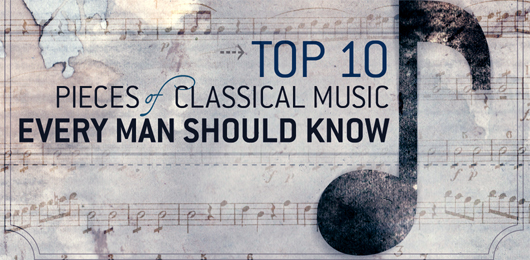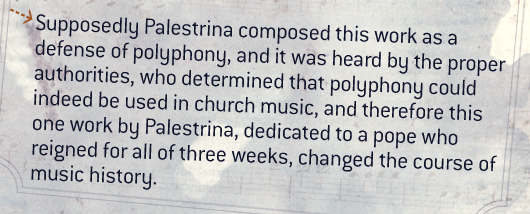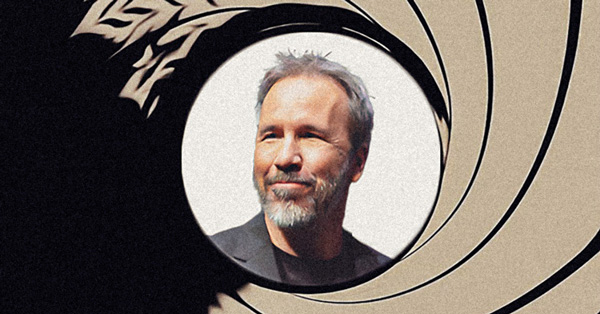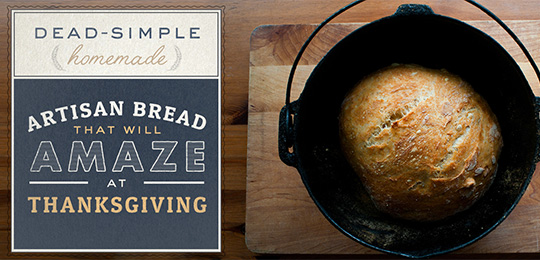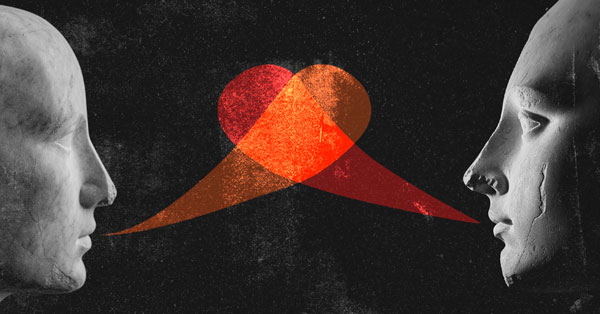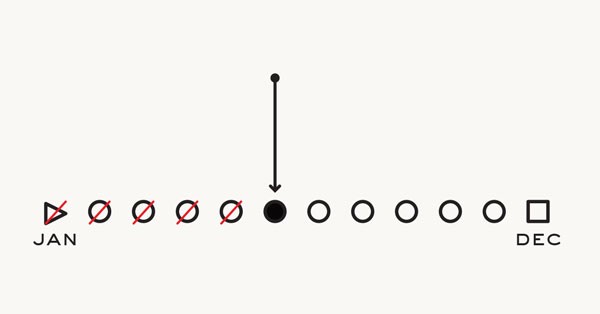So you're at the point where you've decided that becoming familiar with at least the rudiments of classical music is an important part of your development into a more sophisticated, urbane, worldly man. You still love Metallica, or Jay-Z or The Killers or Flogging Molly or Mongolian goat-roping music or whatever your particular thing happens to be, but you're unsure how to approach the vast, nebulous, intimidating world of ‘classical' music. (Let's forget for a moment the gross inaccuracy of lumping all the music mentioned in this article under one generic term; when I say ‘classical' music, we all know what I'm talking about, and all the music here could fit under that monstrous umbrella.)
Nothing like a ‘Top Ten Pieces of Classical Music That Must Be Heard Above All Others' list to get the ball rolling, so let me explain the format:
I've picked ten pieces, all of which are extremely well-known to classical aficionados, most of which are well-known to the wider world. I'll include a brief note on the piece, as well as a recommendation or two of other works or composers that might be appealing if you enjoy that particular work. For some help with terminology and listening approaches, see my previous article, How to Talk About Classical Music.
Some works have well-known nicknames, rarely attributed to the work by the composer himself.
I'm sure those in the know will skewer me for leaving out any one of ten thousand other possible choices, but three main factors have guided my selection of this list as a whole, not necessarily each particular piece on this list. They are: accessibility, popularity, and variety, both stylistic and temporal.
In no particular order, here they are:
1. Wolfgang Amadeus Mozart, Eine Kleine Nachtmusik
If you don't recognize this immediately upon hearing it, you've been living in a cave since the day you were born. Please step into the light, pull your fingers out of your ears, and begin your journey towards joining the human race. Simple, elegant, beautiful, utterly timeless.
If you like this try: string quartets by Mozart or Luigi Boccherini, chamber music by Ignaz Pleyel or Carl Maria von Weber.
2. Johann Sebastian Bach, The Goldberg Variations
One of the most important classical recordings of the twentieth century (on any list) is oddball Canadian genius Glenn Gould’s 1955 recording of The Goldberg Variations, a keyboard suite by J.S. Bach, master of the Baroque. Connoisseurs often point to his 1981 recording of the same work as better than the 1955. Either way, you won’t go wrong. Sublime and stirring, the opening movement of the work is as soulful and beautiful as you could possibly want.
If you like this try: Bach’s French Suites, English Suites, The Well-Tempered Clavier. Keyboard pieces by Domenico Scarlatti or G.F. Handel.
3. Antonio Vivaldi, The Four Seasons
This is a set of four concertos, named–you guessed it–one for each season. Also from the Baroque era, each concerto consists of three movements, and they are very programmatic–that is, different themes represent specific scenes or events through sound. If you listen closely it's not hard to hear a harvest-time barn dance, slippery winter ice, birds singing, growling thunder and sudden storm. Certain segments of this are extremely popular and you will definitely recognize them.
If you like this try: some of Vivaldi's 500 other concertos, Arcangelo Corelli, Bach’s Brandenburg Concertos, Concerti Grossi by George Frederic Handel.
4. Georges Bizet, Carmen
There's a popular joke amongst art music aficionados that all the best Spanish classical music was written by Frenchmen. What, no laughter? I guess you have to be a big music nerd like me to find that funny. Yes, Carmen is an opera, written by a Frenchman and set in Spain. Considered by many to be the most perfect opera ever written, it's ridiculously popular and will make you sound more educated and sophisticated to be able to recognize the arias from this work. If you're only ever going to know one opera, it might as well be this one. And who knows? You might even become a secret opera lover…
If you like this try: Other Popular Operas: Gioachino Rossini, The Barber of Seville (Bugs Bunny music), Giacomo Puccini, La Boheme. Spanish-themed classical music: Symphonie Espagnole by Edouard Lalo, Bolero by Maurice Ravel (both Frenchmen).
5. Ludwig van Beethoven, Symphony No. 6 (Pastoral)
More program music here, but in a very different style from Vivaldi. If you ever watched
Disney's Fantasia as a kid you'll know this one. Beethoven wrote grand, fantastic symphonies on a scale that went far beyond any who had gone before him. His nine symphonies are one of the artistic pinnacles of Western civilization, and No. 6 is my personal favorite. Imagine an idyllic walk through a central European countryside as you listen, and the music will unfold like magic.
If you like this try: Beethoven's 5th and 9th Symphonies, symphonic works by Franz Schubert and Felix Mendelssohn. Great symphonies from other time periods include Gustav Mahler’s Symphony No. 1 in D Major (the ‘Titan’), Mozart’s Symphony No. 41 in C Major (the ‘Jupiter), Symphonie Fantastique (programmatic) by Hector Berlioz, Symphony No. 6 in B Minor (the ‘Pathetique) by Tchaikovsky. La Mer by Claude Debussy (also programmatic; so much so that it is considered a tone poem.)
6. George Frederic Handel, Messiah
Handel was one of the greatest composers of oratorios who ever lived. An oratorio could be thought of as an opera with no costumes, staging or movement: the singers and chorus stand there and perform a long work that typically tells a continuous story. The Messiah, usually performed around Christmas time, tells the story of the birth, life and death of Jesus. The Hallelujah chorus just might be the most well-known classical tune in the world, but there are so many great tunes here it’s impossible to list them all.
If you like this try: Handel's other oratorios, such as Samson or Solomon. Masses by Franz Joseph Haydn, cantatas by J.S. Bach, Vivaldi’s Gloria.
7. Igor Stravinsky, The Rite of Spring
This is a ballet. Before you ask me where my pink tutu is, know that this ballet is about ritualistic pagan sacrifices and ends with the slaughtering of a young girl, and was so controversial that it caused a riot when it premiered in 1913. Yes, this one was also in Fantasia (the dinosaur thing) but I'm not mining Walt Disney for music; it's just coincidence, and the fact that this is great music. Don't look for catchy melodies to hum in this one; it's all atmosphere, violent, percussive clashing, atonal dissonance and off-beat rhythms. Well-worth a listen if you want to challenge yourself a bit. Listen to it three times and you'll be hooked for life.
If you like this try: Stravinsky's other ballet suites like The Firebird and Petrushka; Arnold Schoenberg (if the whole atonalism thing turns you on).
8. Giovanni Pierluigi da Palestrina, Missa Papae Marcelli
‘Early music,' as the term is used among musicologists, loosely describes all music before 1750, which was the end of the Baroque era. This work, composed during the Renaissance, definitely qualifies. The legend has it that the Catholic Church was considering banning all music that was polyphonic, or exhibiting two or more independent melody lines running simultaneously. ‘Too confusing and/or lascivious,’ they said. Supposedly Palestrina composed this work as a defense of polyphony, and it was heard by the proper authorities, who determined that polyphony could indeed be used in church music, and therefore this one work by Palestrina, dedicated to a pope who reigned for all of three weeks, changed the course of music history. Good story, no one really knows how much truth there is to it, but this is a summation of the finest strands of Renaissance vocal music and is stupendously, gloriously beautiful. The Kyrie especially is positively transcendental, whether or not you are the religious type.
If you like this try: Miserere mei, Deus by Gregorio Allegri (usually just called ‘Allegri’s Misere.’) Choral works by Thomas Tallis, Tomas Luis de Victoria, Josquin des Prez.
9. Pyotr Ilyich Tchaikovsky, Piano Concerto No. 1
In 1958, at the height of the Cold War, the Soviets held the first quadrennial Tchaikovsky Piano Competition in Moscow. The unlikely winner was a lanky young Texan by the name of Van Cliburn, who, even in those extremely tense, nationalistic times, so wowed the world that he became an overnight celebrity, and the Russians began calling him ‘Vanka,’ (‘our little Van’.) I’ve had the pleasure of hearing Vanka play this work live; it’s his signature piece, and with one ferocious concert he propelled it into the public consciousness forever.
If you like this try: Other good piano concertos of widely varying styles: Sergei Rachmaninov, Piano Concerto No. 3., Piano Concerto No. 5 by Beethoven (the ‘Emperor’ concerto,) Piano Concerto in A minor by Edvard Grieg. Piano music generally: Beethoven’s piano sonatas (try the Hammerklavier or Sonata quasi una fantasia (‘Moonlight.), anything by Frederic Chopin or Franz Liszt.
10. Dmitri Shostakovich, String Quartet No. 8 in C Minor
Shostakovich was a tragic figure whose genius managed to shine even through the stifling censorship of the Soviet regime under which he lived. The string quartet is one of the most important compositional vehicles in classical music, and Shostakovich (along with Beethoven, Mozart, Haydn, Bela Bartok) is considered one of the masters of this form. This particular work was written over the course of a few days in Dresden in 1960 when the composer was said to have been contemplating suicide. Dark, furious, intense, melancholy, brooding—officially this work was composed as a memorial for the victims of fascism, but Shostakovich may have really intended a broader message, that of repudiation of totalitarianism in general (which would of course include the Soviet government…)
If you like this try: other Shostakovich string quartets, definitely the Beethoven string quartets (the ‘Razumovsky’ quartets are some of my favorites), String Quartet No. 12 in F (the ‘American’) by Antonin Dvorak. String quartets by Bartok, one delightful one by Debussy.
Well there you have it: my list, highly subjective, intensely ruminated over, and by no means complete. If you were to listen to all of these recordings it would give you a well-rounded feel for the vast sweep of ‘classical music,’ and expose you to the tremendous variety therein. Hit me up in the comments sections with any questions or complaints; I’ll be happy to address them.



